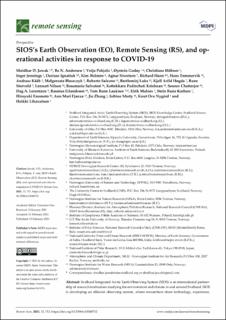SIOS’s Earth Observation (EO), Remote Sensing (RS), and operational activities in response to COVID-19
Jawak, Shridhar D.; Andersen, Bo N.; Pohjola, Veijo; Godøy, Øystein; Hübner, Christiane E.; Jennings, Inger; Ignatiuk, Dariusz; Holmen, Kim; Sivertsen, Agnar; Hann, Richard; Tømmervik, Hans; Kääb, Andreas; Błaszczyk, Małgorzata; Salzano, Roberto; Luks, Bartłomiej; Høgda, Kjell Arild; Storvold, Rune; Nilsen, Lennart; Salvatori, Rosamaria; Krishnan, Kottekkatu Padinchati; Chatterjee, Sourav; Lorentzen, Dag Arne; Erlandsson, Rasmus; Lauknes, Tom Rune; Malnes, Eirik; Karlsen, Stein Rune; Enomoto, Hiroyuki; Fjæraa, Ann Mari; Zhang, Jie; Marty, Sabine; Nygård, Knut Ove; Lihavainen, Heikki
Peer reviewed, Journal article
Published version

Åpne
Permanent lenke
https://hdl.handle.net/11250/2735638Utgivelsesdato
2021Metadata
Vis full innførselSamlinger
Sammendrag
Svalbard Integrated Arctic Earth Observing System (SIOS) is an international partnership of research institutions studying the environment and climate in and around Svalbard. SIOS is developing an efficient observing system, where researchers share technology, experience, and data, work together to close knowledge gaps, and decrease the environmental footprint of science. SIOS maintains and facilitates various scientific activities such as the State of the Environmental Science in Svalbard (SESS) report, international access to research infrastructure in Svalbard, Earth observation and remote sensing services, training courses for the Arctic science community, and open access to data. This perspective paper highlights the activities of SIOS Knowledge Centre, the central hub of SIOS, and the SIOS Remote Sensing Working Group (RSWG) in response to the unprecedented situation imposed by the global pandemic coronavirus (SARS-CoV-2) disease 2019 (COVID-19). The pandemic has affected Svalbard research in several ways. When Norway declared a nationwide lockdown to decrease the rate of spread of the COVID-19 in the community, even more strict measures were taken to protect the Svalbard community from the potential spread of the disease. Due to the lockdown, travel restrictions, and quarantine regulations declared by many nations, most physical meetings, training courses, conferences, and workshops worldwide were cancelled by the first week of March 2020. The resumption of physical scientific meetings is still uncertain in the foreseeable future. Additionally, field campaigns to polar regions, including Svalbard, were and remain severely affected. In response to this changing situation, SIOS initiated several operational activities suitable to mitigate the new challenges resulting from the pandemic. This article provides an extensive overview of SIOS’s Earth observation (EO), remote sensing (RS) and other operational activities strengthened and developed in response to COVID-19 to support the Svalbard scientific community in times of cancelled/postponed field campaigns in Svalbard. These include (1) an initiative to patch up field data (in situ) with RS observations, (2) a logistics sharing notice board for effective coordinating field activities in the pandemic times, (3) a monthly webinar series and panel discussion on EO talks, (4) an online conference on EO and RS, (5) the SIOS’s special issue in the Remote Sensing (MDPI) journal, (6) the conversion of a terrestrial remote sensing training course into an online edition, and (7) the announcement of opportunity (AO) in airborne remote sensing for filling the data gaps using aerial imagery and hyperspectral data. As SIOS is a consortium of 24 research institutions from 9 nations, this paper also presents an extensive overview of the activities from a few research institutes in pandemic times and highlights our upcoming activities for the next year 2021. Finally, we provide a critical perspective on our overall response, possible broader impacts, relevance to other observing systems, and future directions. We hope that our practical services, experiences, and activities implemented in these difficult times will motivate other similar monitoring programs and observing systems when responding to future challenging situations. With a broad scientific audience in mind, we present our perspective paper on activities in Svalbard as a case study. Earth observation; Remote sensing; COVID-19; Svalbard; Earth System Science; SIOS
